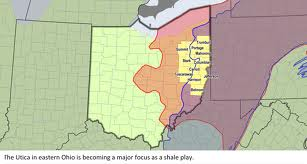 Marcellus & Utica Shale Fracking Taking a Toll on Our Land
Marcellus & Utica Shale Fracking Taking a Toll on Our Land
Article by Shane Hoover, The Canton (Ohio) Repository, October 3, 2013
An environmental group released a report Thursday that it says quantifies the environmental costs of fracking in Ohio and across the country.
“The numbers don’t lie,” said Christian Adams, Clean Energy Associate with Environment Ohio, during a press conference next to the Mahoning River. “Fracking has taken a dirty and destructive toll on our environment and if fracking continues unchecked, it’s only going to get worse.”
Fracking is a popular term for the practice of horizontally drilling wells, then injecting them with water, chemicals and sand under high pressure to fracture rock formations, thereby releasing natural gas and oil. The process is being used in the Utica and Marcellus shale regions of Ohio.
Supporters of unconventional drilling say it will boost the state and national economies. Opponents say it damages water resources, pollutes the air, scars the land and produces waste laced with toxic chemicals and radioactive elements.
According to the report, the impact of fracking in Ohio between 2005 and 2012 has included:
• 334 wells (234 drilled last year).
• 1.4 billion gallons of water used.
• 30 million gallons of waste water produced in 2012.
• The release of the equivalent of 420,000 metric tons of carbon dioxide.
• 1,600 acres damaged.
The report, titled “Fracking By the Numbers,” was written by authors with the Frontier Group and the Environment America Research & Policy Center who said they relied on numbers reported to the state by drillers in compiling Ohio’s numbers.
By any measure, unconventional drilling is still small scale in Ohio. For example, neighboring Pennsylvania has had 6,651 wells since 2005, with a corresponding increase in impacts, according to the report, which estimates there are 82,000 fracking wells across the country.
“The trajectory of the oil and gas industry is to dramatically expand its drilling here in Ohio and in the Marcellus region, which will lead to an even greater amount of waste and more environmental and health problems,” said Vanessa Pesec of the Network For Oil & Gas Accountability and Protection.
Creating a sufficient regulatory system is implausible given the scale and severity of fracking’s impact, according to the report.
Adams and Pesec said Ohio should pass a moratorium on unconventional drilling, and they called on federal officials to strengthen hazardous waste laws for drilling waste and to enact more protections for public land.
The location of the press conference was noteworthy for two reasons. Youngstown was the site of earthquakes triggered by waste-water injection in 2011, and earlier this year authorities discovered that illegally dumped drilling waste water had polluted the Mahoning River.
